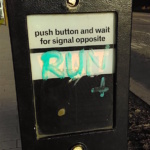by Mireia Prats
Sometimes I wonder if we are losing our ability to wait. At least, to wait patiently. New technology responds to our needs so fast that we usually expect other aspects of our life to be fast as well.
We want the traffic light to turn green quickly because who likes to waste time doing nothing? We want to read the article in 2 minutes but it is so long that we end up reading just the headline and several words in bold. We want dinner to be ready right now. We become restless if someone takes too long to text back. But everything in life has its own tempo and there is nothing we can do to alter it. Fish needs a certain amount of time to be thoroughly cooked and the traffic light to change from red to green. As we get used to this fast-paced way of living we progressively forget to savour the deliciousness of slow things.
Not a long time ago, you would buy an envelope and sit down to write a letter in your best handwriting, making sure it was understandable for the reader. You would send it not knowing exactly when it would reach its recipient. There were so many factors at stake that it was almost impossible to predict. Probably it was all about magic: an uncertain journey.

You would not know either when the receiver would choose to open the envelope and read its content. Maybe he would open the envelope first and read the letter several days after. Maybe he would rip the letter and throw it into the fireplace, because you know, it was cold outside. Obviously, you would not know either how much time would pass between the recipient reading the letter and answering it. And finally sending it. A few days, weeks or perhaps several months?
Maybe he would eventually forget about the letter or simply decide not to answer back. Or he would decide to do so, but the letter would fall off the mail truck and would never reach you. Or maybe it eventually would. Anyway, everything was quite uncertain.
Now you can know for sure that your letter has been successfully sent and delivered. You are also provided with the exact time when the receiver decided to open the envelope and read the letter. You can even know that he is reading –and probably answering– letters right now, but just not yours. You can know the exact time when he stopped reading letters to do something probably more interesting –or probably not–, which, I am so sorry to inform you, you cannot always know about.
I guess that now we are given so much information about the whole process, which leads us to being more and more impatient when we are asked to wait too long. Or maybe we should see it as a challenge that is trying to teach us to be patient against all odds.










